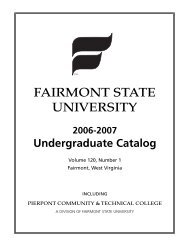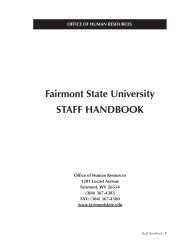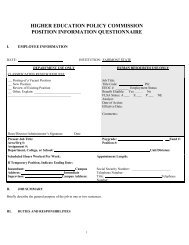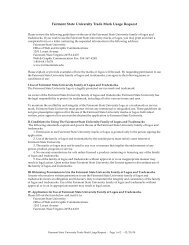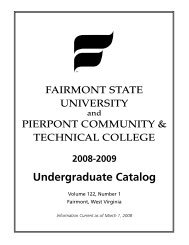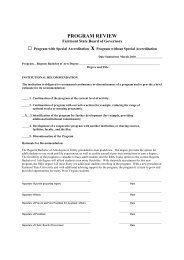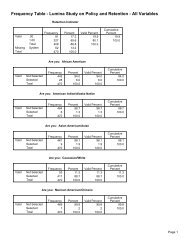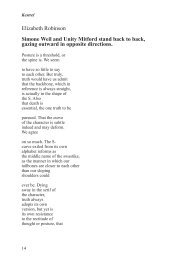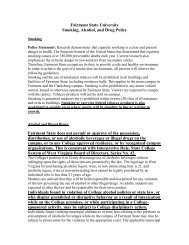Faculty Handbook - Fairmont State University
Faculty Handbook - Fairmont State University
Faculty Handbook - Fairmont State University
Create successful ePaper yourself
Turn your PDF publications into a flip-book with our unique Google optimized e-Paper software.
116<br />
POLICY STATEMENTS<br />
FAIRMONT STATE UNIVERSITY HARASSMENT POLICY<br />
In an effort to develop a racial harassment policy and in revising the existing sexual<br />
harassment policy, a committee including students, faculty, and staff developed this general<br />
harassment policy addressing all forms of harassment. Because the most common forms of<br />
harassment have historically been racial and sexual, clarifying statements accompany this<br />
general harassment policy to further define these two forms of harassment and outline<br />
<strong>Fairmont</strong> <strong>State</strong> <strong>University</strong>’s educational approaches to these areas.<br />
For more information or to file a complaint call:<br />
304-367-4386<br />
Director of Affirmative Action<br />
Room 324, Hardway Building<br />
<strong>Fairmont</strong> <strong>State</strong> <strong>University</strong><br />
<strong>Fairmont</strong>, WV 26554<br />
I. Introduction<br />
<strong>Fairmont</strong> <strong>State</strong> <strong>University</strong> is dedicated not only to learning but also to enhancing and<br />
enriching the quality of life for all of its students and campus personnel. <strong>Fairmont</strong> <strong>State</strong><br />
<strong>University</strong> seeks to educate and support an environment which prepares individuals for<br />
participation in an increasingly diverse world, one in which academic freedom prevails<br />
cohesively with respect for the acceptance of differences of race, national origin, color,<br />
ethnicity, age, veteran status, disability, religion, sexual orientation, gender, and<br />
association with persons different from oneself.<br />
<strong>Fairmont</strong> <strong>State</strong> <strong>University</strong> embraces the principles of free speech guaranteed by the First<br />
Amendment to the United <strong>State</strong>s Constitution. It also abhors the deliberate abuse of this<br />
freedom by those who would provoke hatred and violence. Even though principles of<br />
academic freedom and freedom of speech require tolerance of some ideas and opinions<br />
which may be offensive, harassment cannot and will not be tolerated at <strong>Fairmont</strong> <strong>State</strong><br />
<strong>University</strong>. Those categories of speech which are protected under First Amendment<br />
freedom of speech protections, but which have negative connotations, are however<br />
considered inappropriate and offensive behaviors at <strong>Fairmont</strong> <strong>State</strong> <strong>University</strong> and will<br />
be addressed through educational measures.<br />
<strong>Fairmont</strong> <strong>State</strong> <strong>University</strong> is aware of the potential "chilling effect" which a harassment<br />
policy might have on the free exchange of ideas, the right of free speech and the tradition<br />
of academic freedom. It is not the intent of this policy to legislate a "hate speech code" or<br />
to impact in any way on verbal discourse in any campus activity at <strong>Fairmont</strong> <strong>State</strong><br />
<strong>University</strong> where ideas are exchanged, differences expressed, opinions shared, etc., even<br />
when these verbalizations may be repugnant or repulsive to certain parties or<br />
individuals who are involved or privy to the discourse in question.<br />
It is only when these expressions breach the context of the exchange of ideas and enter<br />
the domain of harassment, as defined by the <strong>Fairmont</strong> <strong>State</strong> <strong>University</strong> Harassment<br />
Policy, that the institution could be compelled to respond in a way that demonstrates its<br />
abhorrence of such expressions, and renders either a prescriptive sanction, educational<br />
response, or supervisory action defined as appropriate with reference to the guidelines<br />
of the Harassment Policy and which is in compliance with the right of free speech in<br />
accordance with Supreme Court interpretations of the First Amendment.



